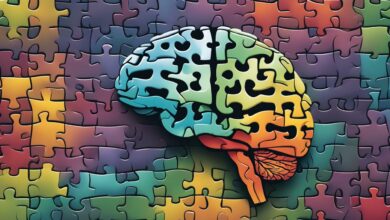Unlocking the Secrets of Good Sleep for Better Health

Welcome to our comprehensive guide on sleep health and overall wellness. As we all know, sleep is an essential component of a healthy lifestyle. It is the time when our bodies repair and regenerate, and our minds process and consolidate information. Quality sleep plays a crucial role in our physical and mental health, making it essential for maintaining vitality and overall well-being.
Key Takeaways
- Sleep health is a crucial component of overall wellness and vitality.
- Quality sleep impacts our physical and mental health.
- Sleep is the time when our bodies repair and regenerate, and our minds process and consolidate information.
- Improving sleep hygiene and establishing healthy sleep routines can promote better sleep.
- Common sleep disorders such as insomnia, sleep apnea, and restless leg syndrome can be managed with available resources and support.
The Importance of Quality Sleep for Overall Well-being
At our core, humans are designed to need quality sleep for optimal physical and mental health. Sleep deprivation can undermine the body’s ability to maintain vital functions, putting us at increased risk for numerous health problems. That’s why prioritizing sleep health is essential to achieving overall well-being.
Quality sleep supports our cognitive function, allowing us to think clearly and perform mentally demanding tasks with ease. It plays a crucial role in our immune system, enabling us to fight off infections and diseases. Sleep also regulates our emotions, helping us manage stress and maintain good mental health.
On the other hand, sleep deprivation can have numerous negative consequences for our health. It can lead to decreased cognitive function, increased stress, and reduced immune system function. Additionally, inadequate sleep has been linked to obesity, diabetes, cardiovascular disease, and other chronic health problems.
By prioritizing our sleep health, we can reap numerous benefits for our overall well-being. In the following sections, we’ll discuss practical tips and strategies for improving our sleep routines and establish healthy sleep habits to optimize our sleep health and achieve sustained vitality.
Tips for Improving Sleep Hygiene and Sleep Routines
At this point, we understand the importance of quality sleep for our overall well-being. Now, it’s time to take action and improve our sleep habits. By making some adjustments to our sleep hygiene and routines, we can create an optimal sleep environment and achieve better sleep quality.
Sleep hygiene refers to the habits and practices that help us prepare for sleep. Poor sleep hygiene can cause difficulties falling and staying asleep, leading to restless nights and daytime fatigue. Here are some effective tips to improve your sleep hygiene:
- Stick to a consistent sleep schedule, even on weekends
- Create a relaxing bedtime routine, such as reading a book or taking a warm bath
- Avoid consuming caffeine and alcohol close to bedtime
- Turn off electronic devices at least 30 minutes before going to bed
- Ensure your bedroom is cool, dark, and quiet
- Invest in comfortable bedding and pillows
Sleep routines can also impact our sleep quality. By establishing healthy sleep routines, we can promote better sleep patterns and improve our overall sleep health. Here are some tips to develop a healthy sleep routine:
- Set a regular bedtime and wake-up time
- Use your bedroom only for sleep and sex
- Avoid napping during the day
- Try relaxation techniques, such as deep breathing exercises or gentle yoga, before bedtime
- Avoid eating large meals close to bedtime
By incorporating these tips into our daily lives, we can make significant improvements to our sleep health. It may take some time to establish new habits, but with patience and perseverance, we can achieve restful nights and better overall well-being.
Common Sleep Disorders and Their Management
Unfortunately, many people are affected by various sleep disorders that can significantly impact their sleep health. Some common sleep disorders include insomnia, sleep apnea, and restless leg syndrome. Insomnia is characterized by difficulty falling asleep or staying asleep, while sleep apnea involves interrupted breathing during sleep. Restless leg syndrome causes an uncomfortable sensation in the legs, leading to a constant urge to move them.
These sleep disorders can have negative effects on physical and mental health, including fatigue, irritability, and decreased cognitive function. Fortunately, there are management options available for individuals experiencing these conditions.
| Sleep Disorder | Management Options |
|---|---|
| Insomnia |
|
| Sleep apnea |
|
| Restless leg syndrome |
|
It’s important to consult with a healthcare professional for proper diagnosis and treatment of sleep disorders. However, making lifestyle changes and improving sleep hygiene habits can also go a long way in improving sleep health and managing these conditions.
Relaxation and Meditation Techniques for Better Sleep
At times, the mind can be too active and restless before bed and make sleeping challenging. However, incorporating relaxation and meditation techniques in your bedtime routine can help calm your mind and aid in achieving better sleep.
Deep Breathing: This technique involves inhaling and exhaling deeply from the diaphragm while focusing on your breath. This practice relaxes your body and lowers your heart rate and blood pressure, thus promoting better sleep.
Guided Imagery: This involves creating a peaceful and calming mental image that helps your mind relax, leading to better sleep. You can find various guided imagery audio programs and apps that can assist with this technique.
Mindfulness Meditation
It involves focusing your attention on the present moment and becoming aware of your thoughts and emotions without judgment. This practice helps your mind relax, reduces anxiety and stress, thus promoting better sleep.
Aromatherapy: This involves the use of aromatic essential oils to promote relaxation, reduce stress, and aid in better sleep. You can diffuse the oils or add them to a warm bath before bedtime.
It is essential to note that finding the right relaxation technique that works for you may take time. It may also be necessary to try different methods to see what works for you. Ensure you set aside sufficient time to practice these techniques for better sleep.
Strategies for Managing Stress and Anxiety for Improved Sleep
Stress and anxiety can significantly impact the quality of our sleep. They can cause difficulty falling asleep, staying asleep, and waking up feeling rested. Managing stress and anxiety is crucial for achieving improved sleep and overall well-being.
To manage stress, try:
- Deep breathing exercises. Inhale slowly through your nose, hold for a few seconds, and exhale through your mouth.
- Muscle relaxation techniques. Tense and relax different muscle groups in your body, starting from your toes and moving up to your head.
- Journaling. Write down your thoughts and feelings to gain clarity and release tension.
- Engaging in relaxing activities, such as taking a warm bath or listening to calming music.
To manage anxiety, try:
- Cognitive-behavioral therapy. This type of therapy can help you change negative thoughts and behaviors that contribute to anxiety.
- Mindfulness meditation. Focus on the present moment and observe your thoughts and feelings without judgment.
- Exercise. Physical activity can help reduce anxiety and promote better sleep.
- Avoiding caffeine, alcohol, and nicotine, which can exacerbate anxiety symptoms.
It’s essential to address stress and anxiety before bedtime to promote restful sleep. Practice relaxation techniques and self-care activities throughout the day to reduce stress levels. Create a calming bedtime routine to prepare your body and mind for sleep.
By managing stress and anxiety through these strategies, you can promote improved sleep and overall wellness.
The Role of Nutrition and Exercise in Sleep Health
When it comes to achieving optimal sleep health, nutrition and exercise play a crucial role. What we eat and how active we are during the day can greatly impact our ability to fall asleep and stay asleep throughout the night.
Nutrition for Better Sleep
What we put into our bodies can have a significant impact on our sleep quality. Certain foods can promote restful sleep by regulating hormones and neurotransmitters that control our sleep-wake cycle.
For example, foods rich in tryptophan, such as turkey, chicken, eggs, and cheese, stimulate the production of serotonin and melatonin, which help induce sleep. Other sleep-promoting foods include complex carbohydrates, such as whole grains, fruits, and vegetables, which can help regulate blood sugar levels and prevent nighttime awakenings.
On the other hand, foods that are high in sugar or caffeine, such as chocolate, sugary drinks, and coffee, can interfere with sleep by disrupting our natural circadian rhythm. It’s best to avoid consuming these types of foods at least a few hours before bedtime.
Exercise for Better Sleep
Regular exercise has been shown to improve sleep quality and duration. Physical activity can help reduce stress and anxiety levels, which are common factors that can hinder sleep. It also increases blood flow and body temperature, both of which can promote relaxation and drowsiness.
However, it’s important to time your exercise routine appropriately. Vigorous exercise too close to bedtime can actually have the opposite effect and make it harder to fall asleep. It’s best to finish your workout at least a few hours before bedtime to give your body enough time to cool down and relax.
Overall, maintaining a healthy and balanced diet, as well as incorporating regular physical activity into your routine, can significantly improve your sleep health and overall well-being.
Creating a Sleep-Friendly Environment for Restful Nights
Creating a sleep-friendly environment is essential for achieving restful nights and improving sleep health. Here are some tips and tricks to transform your bedroom into a peaceful retreat:
| Factor | Tips |
|---|---|
| Temperature | Keep your bedroom cool, ideally between 60-67°F, to promote better sleep. Use a fan or air conditioning unit as needed. |
| Lighting | Ensure your bedroom is as dark as possible. Use blackout curtains or an eye mask if necessary. Avoid using electronic devices with bright screens before bed. |
| Noise | Eliminate or reduce noise as much as possible. Consider using earplugs or a white noise machine to block out unwanted sounds. |
| Bedding | Choose comfortable and high-quality bedding, including pillows, sheets, and blankets. Make sure they are suited to your preferences and create a cozy and inviting sleeping area. |
In addition to these environmental factors, it’s important to minimize electronics usage before bed. The blue light emitted by electronic devices can suppress the production of melatonin, a hormone that regulates sleep. Try to avoid screens for at least an hour before bedtime to promote better sleep quality.
By creating a sleep-friendly environment, you can set yourself up for restful nights and better sleep health.
Integrating Technology for Sleep Tracking and Improvement
In today’s digital age, we have access to an array of technological tools that can help us monitor and improve our sleep. From wearable devices to smartphone apps, technology can provide invaluable insights into our sleep patterns and guide us towards healthier sleep habits.
One popular method for sleep tracking is the use of wearable devices that collect data on our sleep patterns throughout the night. These devices track metrics such as heart rate, movement, and breathing patterns, and provide reports on the duration and quality of our sleep. Some devices even offer personalized recommendations for improvement based on this data.
Smartphone apps are another popular tool for sleep tracking and improvement. These apps use the device’s built-in sensors to monitor movement and noise levels in the bedroom, providing data on sleep duration and interruptions. They may also offer features such as guided meditation, sleep sounds, and sleep tracking reminders to help users establish healthy sleep routines.
When selecting a sleep tracking tool, it is important to consider the features that are most important to you. Some devices may offer more detailed data collection and analysis, while others may prioritize user-friendliness and ease of use. It is also essential to choose a tool that is compatible with your lifestyle and sleep habits.
While technology can be a helpful tool for sleep tracking and improvement, it should be used in conjunction with other strategies for healthy sleep, such as establishing a regular sleep routine and creating a restful sleep environment. By integrating technology into our sleep habits, we can gain valuable insights into our sleep patterns and make informed decisions for better sleep.
Conclusion
Quality sleep is essential for maintaining overall wellness, and its impact on our physical and mental health cannot be overstated. As we have discussed throughout this article, getting adequate, restful sleep has numerous benefits, including improved cognitive function, immune system support, and emotional well-being.
By following the tips and strategies we have provided, you can improve your sleep hygiene and establish healthy sleep routines. We have explored relaxation and meditation techniques to promote better sleep, as well as strategies for managing stress and anxiety, which can interfere with sleep quality. We have also discussed the role of nutrition and exercise in promoting healthy sleep.
Creating a sleep-friendly environment is crucial for restful nights, and we have highlighted factors such as bedroom temperature, lighting, noise reduction, and comfortable bedding. We have also explored the role of technology in sleep tracking and improvement, providing recommendations for choosing and utilizing these tools effectively.
In conclusion, prioritizing sleep in your daily life is essential for achieving sustained vitality and well-being. By implementing the tips and strategies outlined in this article, you can unlock the secrets of good sleep and enjoy the numerous benefits it provides for your overall health.
FAQ
Q: What is the role of sleep health in overall well-being?
A: Sleep health plays a crucial role in our overall well-being. Quality sleep impacts our physical and mental health, and is essential for maintaining vitality and wellness.
Q: What are the benefits of adequate sleep?
A: Adequate sleep has numerous benefits, including improved cognitive function, support for the immune system, and enhanced emotional well-being.
Q: What are some tips for improving sleep hygiene and sleep routines?
A: To improve sleep hygiene and establish healthy sleep routines, it’s important to maintain a consistent sleep schedule, create a sleep-friendly environment, and practice relaxation techniques.
Q: What are some common sleep disorders and how can they be managed?
A: Common sleep disorders include insomnia, sleep apnea, and restless leg syndrome. These disorders can be managed through various treatment options, and seeking professional help is recommended.
Q: What relaxation and meditation techniques can promote better sleep?
A: Deep breathing exercises, guided imagery, and mindfulness meditation are relaxation and meditation techniques that can help individuals unwind and quiet their minds before bedtime, promoting better sleep.
Q: How can stress and anxiety be managed to improve sleep?
A: Stress and anxiety can negatively impact sleep. Managing stress and anxiety can be achieved through stress reduction techniques, cognitive-behavioral therapy, and lifestyle modifications before bedtime.
Q: What role does nutrition and exercise play in sleep health?
A: Nutrition and exercise are important for promoting healthy sleep. Certain foods can aid in sleep regulation, and exercises can enhance sleep quality. Timing meals and exercise can also optimize sleep.
Q: How can a sleep-friendly environment be created for restful nights?
A: Creating a sleep-friendly environment involves factors such as maintaining the right bedroom temperature, reducing lighting and noise, and ensuring comfortable bedding. Minimizing electronic device usage before sleep is also recommended.
Q: How can technology be used for sleep tracking and improvement?
A: Technology can be utilized for sleep tracking and improvement through wearable devices, smartphone apps, and other tools that monitor sleep patterns and provide insights. Choosing and using these tools effectively can optimize sleep.
Q: What is the importance of prioritizing sleep in our daily lives?
A: Prioritizing sleep is crucial for achieving sustained vitality and well-being. It is important to recognize that sleep health significantly impacts our overall quality of life.




